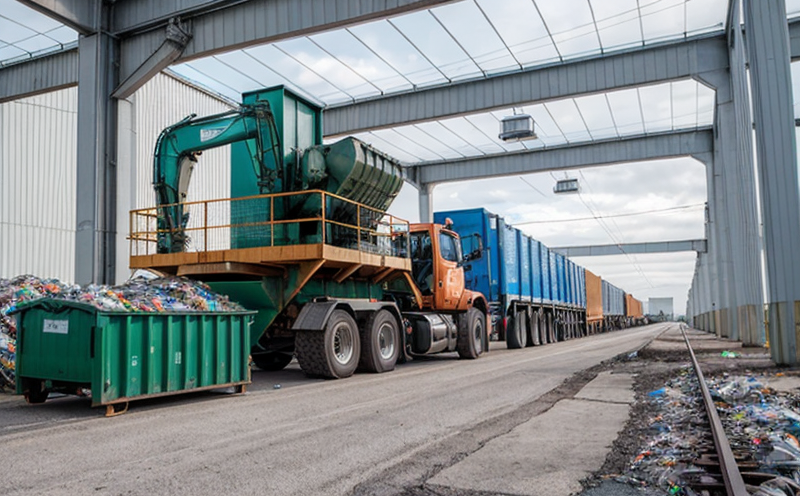ASTM D8183 Solar Panel Recycling Process Testing
The ASTM D8183 standard provides a comprehensive framework for recycling photovoltaic (PV) solar panels, ensuring that the process is environmentally responsible and economically viable. This service focuses on testing procedures that align with this standard to verify the effectiveness of the recycling processes used in industrial manufacturing and processing.
Recycling solar panels presents unique challenges due to their complex materials composition, including silicon, glass, metals, and various adhesives and encapsulants. The ASTM D8183 protocol addresses these complexities by specifying detailed testing methods that assess mechanical integrity, metal purity, glass quality, and overall recyclability.
Our laboratory specializes in providing ASTM D8183 compliant tests for industrial recycling processes of solar panels. We employ state-of-the-art equipment and methodologies to ensure accurate and reliable results. This includes advanced spectroscopy techniques, thermal analysis, and mechanical testing that comply with international standards such as ISO 5890 and EN 12769.
The service covers a wide range of tests which include but are not limited to:
- Material composition analysis
- Mechanical property evaluation
- Residual material detection
- Recyclate purity assessment
- Emission and leachate testing
- Energy recovery efficiency measurement
The thoroughness of this service ensures that recycling processes meet stringent environmental regulations and industrial standards. By leveraging these tests, companies can improve their sustainability efforts while also optimizing resource use and reducing waste.
| Test Parameter | Description |
|---|---|
| Material Composition Analysis | Detailed quantification of the various materials present in the solar panel, ensuring accurate recycling. |
| Mechanical Property Evaluation | Evaluation of mechanical properties to ensure that the recycled materials can be repurposed effectively. |
| Residual Material Detection | Detection and quantification of any remaining materials from the solar panel, which may affect recyclability. |
| Recyclate Purity Assessment | Evaluation of the purity of recycled materials to ensure they meet industrial standards for reuse. |
| Emission and Leachate Testing | Evaluation of emissions and leachates from the recycling process, ensuring environmental safety. |
| Energy Recovery Efficiency Measurement | Assessment of the efficiency with which energy can be recovered during the recycling process. |
The ASTM D8183 standard is critical for industries involved in solar panel manufacturing and recycling. It provides a structured approach to ensure that all stages of the recycling process are conducted efficiently, sustainably, and responsibly. Our laboratory adheres strictly to these standards, providing accurate and reliable testing results.
Benefits
Implementing ASTM D8183 Solar Panel Recycling Process Testing in your industrial manufacturing and processing operations offers numerous benefits:
- Elevated Compliance Standards: Ensures adherence to international standards, reducing the risk of regulatory penalties.
- Enhanced Sustainability: Promotes a circular economy by optimizing resource use and minimizing waste.
- Innovation Drivers: Encourages continuous improvement in recycling processes and technologies.
- Cost Efficiency: By ensuring efficient material recovery, the process can reduce operational costs associated with raw material procurement.
- Increased Market Confidence: Demonstrates a commitment to environmental responsibility, enhancing brand reputation and market standing.
In summary, this service not only ensures regulatory compliance but also supports sustainable practices that are essential for long-term industrial success.
Industry Applications
- Solar Panel Manufacturers: Ensure the quality and safety of recycled materials used in manufacturing processes.
- Recycling Facilities: Validate the effectiveness of their recycling methods to meet environmental regulations.
- R&D Engineers: Develop new technologies that enhance the efficiency and sustainability of solar panel recycling.
- Procurement Departments: Source high-quality recycled materials for use in production processes.
| Industry Segment | Description |
|---|---|
| Solar Panel Manufacturing | The process of manufacturing solar panels using recycled materials, ensuring quality and safety. |
| Recycling Facilities | Evaluation of the effectiveness of recycling processes to ensure environmental compliance. |
| R&D for Circular Economy | Innovations in recycling technologies that improve efficiency and sustainability. |
| Solar Panel Procurement | Ensuring the quality of recycled materials used in production, leading to cost savings and enhanced product performance. |
The ASTM D8183 standard is particularly relevant for these segments as it provides a robust framework for recycling solar panels. By adhering to this standard, industries can ensure that their processes are environmentally responsible and economically viable.
Eurolab Advantages
Choosing Eurolab for ASTM D8183 Solar Panel Recycling Process Testing offers several key advantages:
- Comprehensive Expertise: Our team of experts has extensive experience in industrial recycling and the circular economy.
- State-of-the-Art Equipment: We utilize advanced testing equipment to ensure accurate and reliable results.
- International Standards Compliance: All tests are conducted according to international standards, ensuring consistency and accuracy.
- Customized Solutions: Tailored services that meet the specific needs of our clients in different sectors.
- Rigorous Quality Control: Strict quality control measures ensure that all testing is conducted with precision and care.
- Experienced Personnel: Our personnel are highly trained and experienced, providing expertise in industrial recycling processes.
We pride ourselves on our ability to deliver high-quality, reliable test results that support sustainable practices and regulatory compliance. Our commitment to excellence ensures that we meet the highest standards in every aspect of our services.





